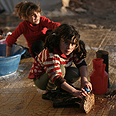
Syrians in Turkey losing hope
Refugees struggle and rebel fighters languish as Assad forces, aided by Hezbollah, reverse losses; 'the revolution has stalled,' Syrian refugee laments
Yusuf Jablawi watched dejectedly as a Syrian girl beseeched diners in a restaurant for a few pennies in this Turkish town near the border with Syria. Her barefoot feet, blackened from the street dirt, blended in with the grime building up on her face and clothes.
As more and more Syrian refugees flee their homes to escape the violence in their homeland, few have the resources to survive in Turkey. “There is little we can do to help them,” lamented Jablawi, 24, an activist from the coastal city of Latakia. “The revolution has stalled.”
Related stories:
- Syrian rebels' missile defense system threatens Israel
- Syrian rebels say documented downing of army chopper
- Syrian rebels flock to Cairo
Jablawi’s demoralized comments were a far cry from the optimism that he shared with foreigners in 2011 and 2012. Back then, he would disseminate information about protest rallies, the low morale of regime supporters and the advances Syrian rebels were making on the battlefield. But today, Jablawi has joined those who bide their time in Turkish restaurants and cafes.
As the regime of Syrian President Bashar Assad has reversed losses on the battlefield and Syrian rebels have begun fighting amongst themselves, the revolution that the world cheered on has ground to a halt. Foreign journalists no longer call Jablawi and his fellow activists and most do not dare venture into a country where jihadists are eager to capture them. There are just a handful of journalists in rebel areas, although the government is beginning to allow journalists to enter for the first time since the civil war began. Most journalists cover the fighting from Lebanon or Turkey.
As a result, the activists, fighters and humanitarian aid workers who worked so hard to cultivate their revolution are now ruminating about where their uprising went awry.
In a four story building in the residential part of Reyhanli, walkie-talkies buzz every time someone seeks to enter. The humanitarian organization that rents it is on guard pro-Assad elements. Inside, the computer hard drives that spun so fast crunching spread sheet data lay idle. The men who operate them now spend their time in the communal room watching Arabic television. “There is not much to do anymore,” Muhammad Sartawi from Hama told The Media Line. “We aren’t bringing in as much food and supplies as we used to.”
Sartawi says that when the regime began going on the offensive in May, the wealthy Persian Gulf donors who funded the group’s operations gradually stopped giving. “They didn’t want to fund an open ended operation. They are scared this is a never-ending revolution.”
Syrian activists believe the revolution took a turn for the worse when the Lebanese organization Hezbollah entered the fray on the side of the regime in the spring. But they also blame the internecine quarrels that have paralyzed the rebel-led Free Syrian Army (FSA). “No one trusts each other anymore,” complained a 28 year old activist in Aleppo who only gave his name as Amr. “The FSA brigades are fighting between themselves for resources more than they are fighting Bashar.”
Amr and others complain that the FSA has lost its bearings, transforming itself from a band of Robin Hoods protecting the people to a gang of outlaws bent on fleecing them. “Some brigades no longer fight,” noted Hamdi Suleiman, a 24 year old activist from the city of Idlib. “They spend all their time stealing. The people don’t like this.”
As Syrians turn against the FSA, the logistical networks which worked in its shadows have suffered. “People don’t want to help us anymore,” humanitarian aid worker Hamza Rida told The Media Line. “Pharmacists used to give us free medicine. Grocers handed out food. But now they say they have nothing for us.”
Frustrations such as these have pushed activists like Jablawi to leave Syria. “There is not much we can do to help the revolution when Syrians don’t want to help us,” he said. “But even worse, the foreign journalists don’t want our help anymore either.
As the international media is fixated on the struggle between the military and the Muslim Brotherhood in Egypt, few reporters are focusing on Syria. In addition, a spate of kidnappings of foreign journalists in Syria has made the country a mini-Iraq that few want to venture into. “It’s dangerous and getting worse by the day,” says a correspondent for a major Western publication. “If no one is asking for articles, why should we risk it?”
And as the world turns its back on the country, the risks Syrians took for their revolution are looking more and more like a futile effort.
Article written by Michel Stors, courtesy of The Media Line
- Receive Ynetnews updates directly to your desktop










